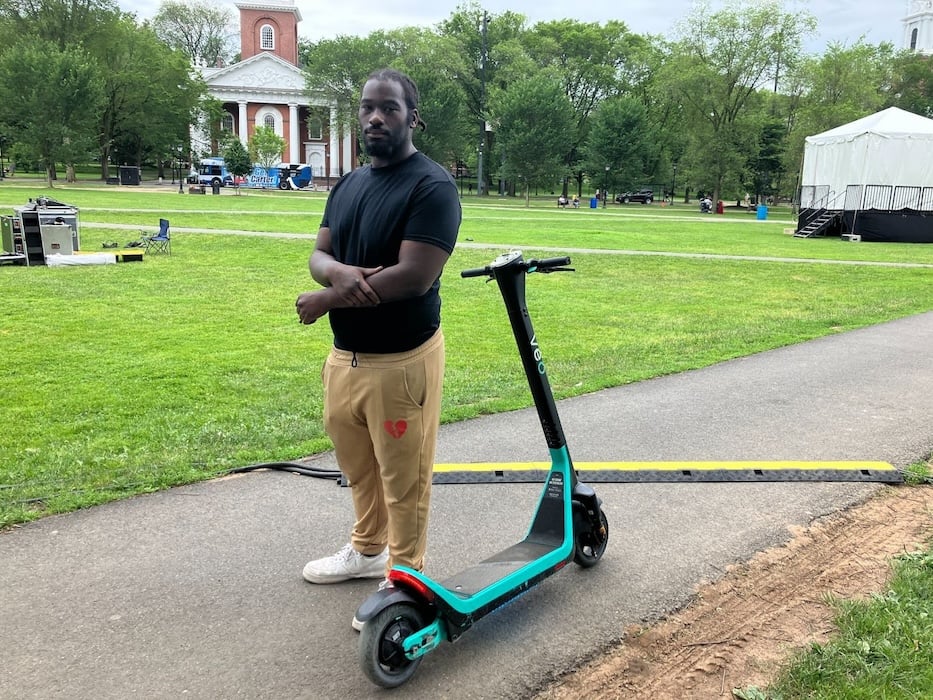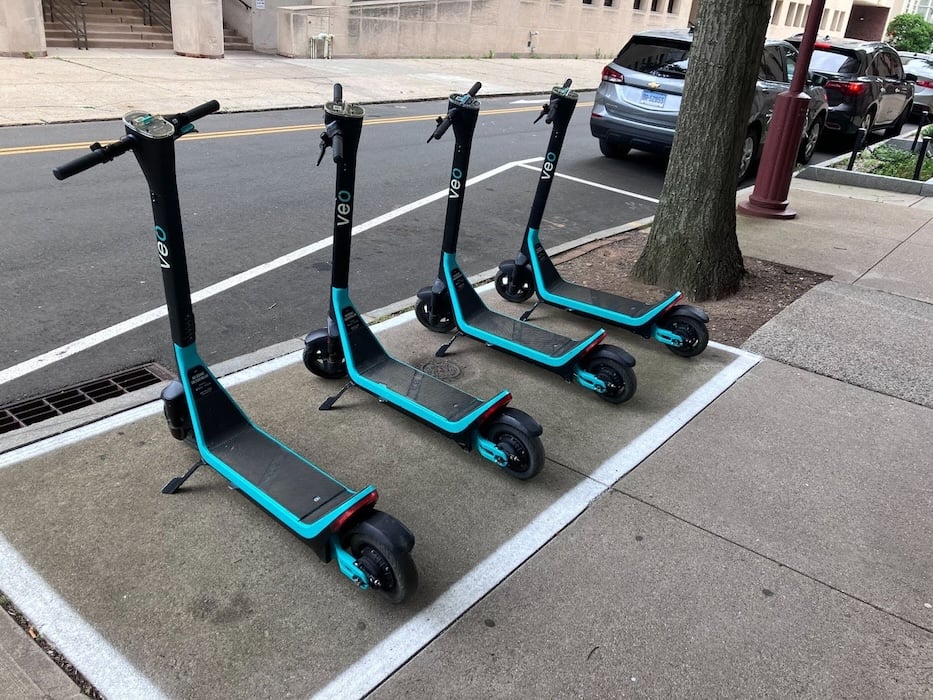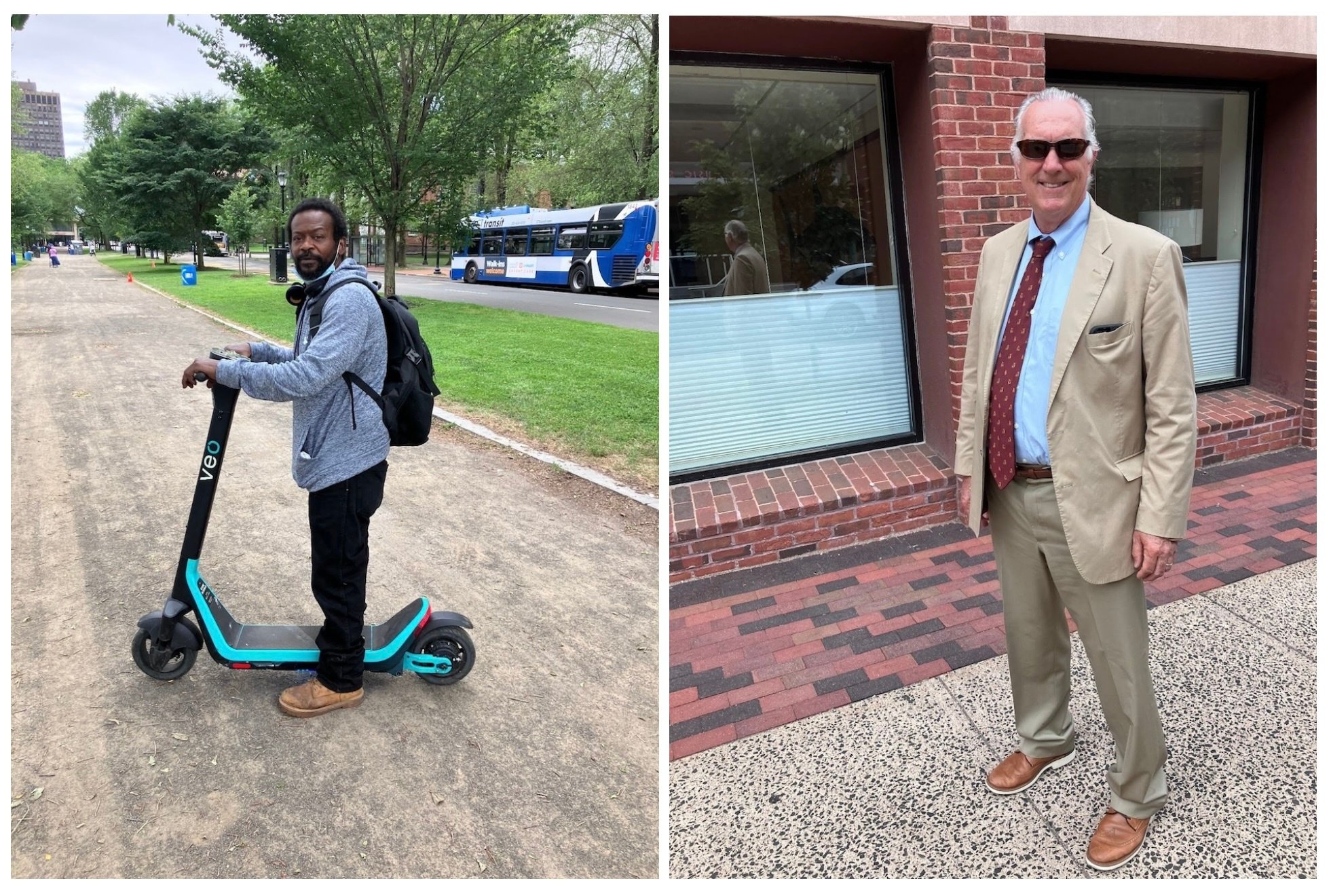
Kyreese Little with his scooter. Tal Berkowitz Photos.
Kyreese Little was having a bad day. Then he rode downtown on a Veo electric scooter, an experience he called “therapeutic.”
Now, he is one among dozens of New Haven residents who hold strong opinions about the city’s newest transportation option.
The three hundred Astro-model scooters, manufactured and operated by Veo Micromobility, appeared on the streets of New Haven in late May. They can be unlocked for a fee of $1 and cost an additional $0.40 per minute.
“Offering electric scooters is another step toward creating a city where everyone has access to convenient, affordable, and safe transportation options that help them get from point A to point B,” said Mayor Justin Elicker in a press release at the end of May, calling them a “very fun way to get around and explore the city.”
“This initiative builds on the city’s ongoing efforts to expand travel options in a climate-friendly way, helping residents access active transportation that benefits both their quality of life and our environment.”

Scooters parked on Wall Street. Tal Berkowitz Photos.
Some riders and residents feel the scooters don’t live up to the mayor’s promises. When asked about the affordability, Isaiah, who declined to give his last name, suggested that the pricing doesn’t scale well for long usage.
“You’re paying ten dollars for ten minutes and 20 dollars for 20 minutes,” he noted, referring to the fact that the per minute rate isn’t reduced for longer rides.
First-time scooter rider David W agreed, saying he didn’t enjoy the scooters due to the cost. “To repair it, the price is admirable, but … After this I don’t think I’m gonna use [the scooters] simply because of the pricing,” he said.
David added that he usually bikes or uses public transit, which he described as more “convenient.”
In regards to safety, David said that he had seen people engaging in reckless behavior with the scooters, such as “throwing them, slamming them, leaving them in the middle of the street, and challenging cars.” He also suggested that the speed they travel at could be uncomfortable or hazardous, saying “Normally the teenagers … ride these more so than the adults. I see why now.”

Two dissenting voices: David W and his scooter and Richard Lynch. Tal Berkowitz Photos.
Little agreed that some riders, especially teens, ride the scooters in a way that is unsafe for both themselves and pedestrians. He said that his experiences with the scooters had been mostly pleasant “besides the little kids trying to crash them.”
Despite the fact that users under the age of 18 are prohibited from riding the scooters and risk having their Veo account suspended, concerns about reckless behavior among teens are common among Downtown regulars.
Richard Lynch, a lawyer who lives in Guilford and works in New Haven said that he’d “seen kids zooming in and out of traffic [and] coming down one-way streets the wrong way.” He added that many riders are “not wearing helmets [and] they’re not wearing proper clothing if they fall.”
Lynch said he’d never used the scooters himself, but would have if they were available when he was younger.
Lynch foresaw a troubling, but ultimately positive, future for the scooters. He predicted that they will lead to “bad injuries and wrongful deaths” initially, but believes that they will become safer and require a license to operate.
Another downtown lawyer, who declined to give an interview and then spoke about the scooters unprompted, agreed with Lynch that the scooters could be unsafe. “I’m a personal injury lawyer. We love 'em. We love anything that’s gonna get people hurt,” he said.
While there are concerns about the safety of e-scooters, research suggests that they are actually safer than conventional bicycles. According to a 2019 study by People For Bikes, about 13 percent of Americans ride a bicycle at least twice monthly. According to a 2025 survey by Statista, five percent of Americans use electric scooters at least monthly.
Despite this relative similarity in number of users, five times more cyclists than scooter riders were hospitalized for injuries between 2018 and 2022, according to a 2024 report from researchers at the University of California San Francisco.
The Department of Transportation, Traffic, and Parking did not respond to multiple requests for comment.
This article comes from the 2025 cohort of the Youth Arts Journalism Initiative (YAJI). YAJI is a program in which New Haven, Hamden and West Haven Public Schools high school students pitch, write, edit and publish articles through the Arts Paper. This year, YAJI advisors include Arts Paper Editor Lucy Gellman and reporter and YAJI alum Abiba Biao. Tal Berkowitz is a rising junior at Wilbur Cross High School.